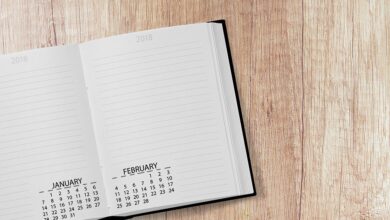
Why Keeping a Calendar is Essential for Productivity
In today’s fast-paced world, it can be overwhelming to keep track of all the tasks and responsibilities we have. From important appointments and meetings to social events and personal goals, it’s challenging to stay organized and ensure we are making the most of our time. This is where keeping a calendar becomes essential for productivity. A calendar not only helps us manage our time efficiently but also provides a visual representation of our commitments, allowing us to prioritize effectively and achieve our goals. In this article, we will explore why keeping a calendar is crucial for enhancing productivity and discuss some practical tips on how to make the most of this invaluable tool.
First and foremost, a calendar helps us plan ahead and manage our time effectively. By having a clear overview of our schedule, we can allocate adequate time for each task or commitment. Whether it’s a deadline for a project, a family event, or a personal activity, a calendar provides us with a structured framework within which we can plan and execute our tasks. Without a calendar, we may find ourselves juggling conflicting commitments or struggling to meet deadlines, leading to unnecessary stress and a decrease in productivity.
Furthermore, a calendar serves as a visual reminder of our goals, allowing us to stay focused and motivated. By setting specific goals and assigning them time slots in our calendar, we create a sense of accountability for our actions. Each time we glance at our calendar, we are reminded of the tasks we need to complete or the milestones we need to achieve. This constant reinforcement helps us stay on track, avoid distractions, and make progress towards our goals. In this way, a calendar becomes an invaluable tool for not only better time management but also for personal growth and self-improvement.
Another significant advantage of using a calendar for productivity is that it enables efficient planning and coordination with others. In both professional and personal settings, collaboration is often necessary for successful outcomes. By sharing our calendars with colleagues, team members, or family members, we can synchronize our schedules, avoid conflicts, and maximize productivity. This transparency and coordination eliminate the need for repetitive meetings or email exchanges, streamlining communication and fostering collaboration. In addition, a shared calendar allows others to understand our availability, making it easier for them to plan and seek assistance or input when needed.
Moreover, a calendar provides us with a realistic perspective of the time required for each task. Often, we underestimate the time it takes to complete certain activities, causing us to overcommit or rush through tasks, compromising their quality. By allocating appropriate time slots for each task in our calendar, we can better estimate the demands of our commitments. This not only helps us maintain a balanced workload but also ensures that we can allocate sufficient time to complete our tasks effectively and efficiently. Recognizing the importance of time management, Dr. Randolph Bias, a professor at the University of Texas, states, “Nothing has a higher impact on our productivity than our use of time. The choices we make with our time determine what we accomplish and what we miss.”
To make the most of a calendar and enhance productivity, it is essential to establish good habits and follow some practical tips. Firstly, it is crucial to capture all commitments as soon as they arise. Whether it’s a meeting request, a personal event, or an appointment, write it down immediately in your calendar to avoid forgetting or double-booking. Secondly, prioritize tasks and allocate time based on their importance and urgency. By giving priority to important tasks and assigning specific time slots, you ensure that essential activities are completed first. Additionally, avoid overloading your calendar by allowing some buffer time between tasks to account for unexpected changes or delays.
Regularly reviewing and updating your calendar is also crucial for optimal productivity. Take a few minutes each day or at the beginning of every week to review your schedule, identify any potential conflicts, and make adjustments as necessary. This will help you stay on top of your commitments and ensure that you allocate your time effectively. Lastly, consider utilizing technology by using digital calendar applications or tools that offer reminders, notifications, and sync features. These technological advancements can streamline the process of managing your calendar, making it more convenient and accessible.
In conclusion, keeping a calendar is essential for enhancing productivity in our fast-paced lives. It helps us manage our time effectively, stay focused on our goals, coordinate with others, and gain a realistic perspective of our commitments. By implementing good habits and following practical tips, we can make the most of this invaluable tool and achieve our desired level of productivity. So, why wait? Start using a calendar today and unlock your full potential!





